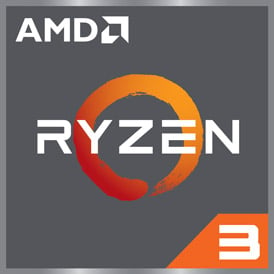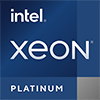
AMD Ryzen 3 5300U Benchmark, Test and specs
Last updated:
The AMD Ryzen 3 5300U is a 4 core processor. It can handle 8 threads simultaneously and was introduced in Q1/2021. The AMD Ryzen 3 5300U is based on the 4. generation of the AMD Ryzen 3 series and requires a mainboard with the socket FP6. The AMD Ryzen 3 5300U scores 1,154 points with one CPU core in the Geekbench 5 benchmark. When using all CPU cores, the result is 3,232 points.

| Name: | AMD Ryzen 3 5300U |
|---|---|
| Family: | AMD Ryzen 3 (33) |
| CPU group: | AMD Ryzen 5000U (Lucienne) (3) |
| Architecture: | Lucienne (Zen 2) |
| Segment: | Mobile |
| Generation: | 4 |
| Predecessor: | AMD Ryzen 3 4300U |
| Successor: | AMD Ryzen 3 5425U |
CPU Cores and Base Frequency
The 4 CPU cores of the AMD Ryzen 3 5300U clock with 2.60 GHz (3.80 GHz). The number of CPU cores and the clock frequency of the processor are largely responsible for the overall performance.
| CPU Cores / Threads: | 4 / 8 |
|---|---|
| Core architecture: | normal |
| Cores: | 4x |
| Hyperthreading / SMT: | Yes |
|---|---|
| Overclocking: | No |
| Frequency: | 2.60 GHz |
| Turbo Frequency (1 Core): | 3.80 GHz |
| Turbo Frequency (4 Cores): | 3.60 GHz |
Internal Graphics
With the AMD Radeon RX Vega 6 (Renoir), the AMD Ryzen 3 5300U has an build in graphic solution. It has 6 SM processors, which have a total of 384 texture shaders. The iGPU not only enables games, but also significantly accelerates video playback.
| GPU name: | AMD Radeon RX Vega 6 (Renoir) |
|---|---|
| GPU frequency: | 0.40 GHz |
| GPU (Turbo): | 1.50 GHz |
| Compute units: | 6 |
| Shader: | 384 |
| Hardware Raytracing: | No |
| Release date: | Q1/2020 |
| Max. displays: | 3 |
|---|---|
| Generation: | 9 |
| Direct X: | 12 |
| Technology: | 7 nm |
| Max. GPU Memory: | 2 GB |
| Frame Generation: | No |
Hardware codec support
Processors that have an integrated graphics can play videos faster and more efficiently. This can have a positive effect on the battery life of notebooks, for example.
| h265 / HEVC (8 bit): | Decode / Encode |
|---|---|
| h265 / HEVC (10 bit): | Decode / Encode |
| h264: | Decode / Encode |
| VP8: | Decode / Encode |
| VP9: | Decode / Encode |
| AV1: | No |
|---|---|
| AVC: | Decode / Encode |
| VC-1: | Decode |
| JPEG: | Decode / Encode |
Memory & PCIeThe AMD Ryzen 3 5300U supports up to 32 GB memory in up to 2 (Dual Channel) memory channels. This results in a maximum memory bandwidth of 51.2 GB/s. |
|
| Memory type: | Memory bandwidth: |
|---|---|
| LPDDR4-4266 DDR4-3200 | 51.2 GB/s 51.2 GB/s |
| Max. Memory: | 32 GB |
| Memory channels: | 2 (Dual Channel) |
| ECC: | Yes |
| PCIe: | 3.0 x 12 |
| PCIe Bandwidth: | 11.8 GB/s |
Thermal ManagementWith the TDP, the processor manufacturer specifies the cooling solution required for the processor. The AMD Ryzen 3 5300U has a TDP of 15 W. |
|
|---|---|
| TDP (PL1 / PBP): | 15 W |
| TDP (PL2): | -- |
| TDP up: | 25 W |
| TDP down: | 10 W |
| Tjunction max.: | 105 °C |
Technical details
The AMD Ryzen 3 5300U has a 6.00 MB large cache. The processor is manufactured in 7 nm. Modern production increases the efficiency of the processor.
| Technology: | 7 nm |
|---|---|
| Chip design: | Chiplet |
| Socket: | FP6 |
| L2-Cache: | 2.00 MB |
| L3-Cache: | 4.00 MB |
| AES-NI: | Yes |
| Operating systems: | Windows 10, Windows 11, Linux |
| Virtualization: | AMD-V, SVM |
|---|---|
| Instruction set (ISA): | x86-64 (64 bit) |
| ISA extensions: | SSE4a, SSE4.1, SSE4.2, AVX2, FMA3 |
| Release date: | Q1/2021 |
| Release price: | -- |
| Part Number: | -- |
| Documents: | Technical data sheet |
Rate this processor
Benchmark results

The benchmark results for the AMD Ryzen 3 5300U have been carefully checked by us. We only publish benchmark results that have been created by us or that have been submitted by a visitor and then checked by a team member. All results are based on and fullfill our benchmark guidelines.
Cinebench R23 (Single-Core)
Cinebench R23 is the successor of Cinebench R20 and is also based on the Cinema 4 Suite. Cinema 4 is a worldwide used software to create 3D forms. The single-core test only uses one CPU core, the amount of cores or hyperthreading ability doesn't count.

|
Intel Core i5-10310U
4C 8T @ 4.40 GHz |
||

|
Intel Core i5-10400
6C 12T @ 4.30 GHz |
||

|
Intel Core i5-10400F
6C 12T @ 4.30 GHz |
||
|
|
AMD Ryzen 3 5300U
4C 8T @ 3.80 GHz |
||

|
Intel Core i7-1060NG7
4C 8T @ 3.80 GHz |
||

|
Intel Core i7-1060G7
4C 8T @ 3.80 GHz |
||

|
Intel Core i5-1038NG7
4C 8T @ 3.80 GHz |
||
Cinebench R23 (Multi-Core)
Cinebench R23 is the successor of Cinebench R20 and is also based on the Cinema 4 Suite. Cinema 4 is a worldwide used software to create 3D forms. The multi-core test involves all CPU cores and taks a big advantage of hyperthreading.

|
Intel Core i5-8500
6C 6T @ 3.70 GHz |
||

|
Intel Core i7-7700
4C 8T @ 4.00 GHz |
||

|
AMD Ryzen 3 3100
4C 8T @ 3.90 GHz |
||
|
|
AMD Ryzen 3 5300U
4C 8T @ 3.60 GHz |
||

|
Intel Core i5-11300H
4C 8T @ 4.20 GHz |
||

|
Intel Core i5-9400F
6C 6T @ 3.90 GHz |
||

|
Intel Core i5-9400
6C 6T @ 3.90 GHz |
||
Geekbench 5, 64bit (Single-Core)
Geekbench 5 is a cross plattform benchmark that heavily uses the systems memory. A fast memory will push the result a lot. The single-core test only uses one CPU core, the amount of cores or hyperthreading ability doesn't count.

|
AMD Ryzen Embedded V2516
6C 12T @ 3.95 GHz |
||

|
AMD Ryzen Embedded V2546
6C 12T @ 3.95 GHz |
||

|
Intel Core i7-9800X
8C 16T @ 4.50 GHz |
||
|
|
AMD Ryzen 3 5300U
4C 8T @ 3.80 GHz |
||

|
Intel Xeon W-3175X
28C 56T @ 3.80 GHz |
||

|
Intel Core i5-7640X
4C 8T @ 4.20 GHz |
||

|
Intel Xeon Platinum 8276
28C 56T @ 4.00 GHz |
||
Geekbench 5, 64bit (Multi-Core)
Geekbench 5 is a cross plattform benchmark that heavily uses the systems memory. A fast memory will push the result a lot. The multi-core test involves all CPU cores and taks a big advantage of hyperthreading.

|
Intel Core i7-6700TE
4C 8T @ 2.40 GHz |
||

|
Intel Core i7-4770R
4C 8T @ 3.60 GHz |
||

|
Qualcomm Snapdragon 870
8C 8T @ 3.20 GHz |
||
|
|
AMD Ryzen 3 5300U
4C 8T @ 3.60 GHz |
||

|
MediaTek Dimensity 1300
8C 8T @ 3.00 GHz |
||

|
Intel Core i5-4670K
4C 4T @ 3.60 GHz |
||

|
Intel Core i5-6685R
4C 4T @ 3.40 GHz |
||
Geekbench 6 (Single-Core)
Geekbench 6 is a benchmark for modern computers, notebooks and smartphones. What is new is an optimized utilization of newer CPU architectures, e.g. based on the big.LITTLE concept and combining CPU cores of different sizes. The single-core benchmark only evaluates the performance of the fastest CPU core, the number of CPU cores in a processor is irrelevant here.

|
Intel Core i7-8700
6C 12T @ 4.60 GHz |
||

|
Intel Core i9-9980XE
18C 36T @ 4.50 GHz |
||

|
AMD Ryzen 5 4600H
6C 12T @ 4.00 GHz |
||
|
|
AMD Ryzen 3 5300U
4C 8T @ 3.80 GHz |
||

|
AMD Ryzen 5 4600HS
6C 12T @ 4.00 GHz |
||

|
AMD EPYC 7F72
24C 48T @ 3.70 GHz |
||

|
Intel Xeon E3-1535M v6
4C 8T @ 4.20 GHz |
||
Geekbench 6 (Multi-Core)
Geekbench 6 is a benchmark for modern computers, notebooks and smartphones. What is new is an optimized utilization of newer CPU architectures, e.g. based on the big.LITTLE concept and combining CPU cores of different sizes. The multi-core benchmark evaluates the performance of all of the processor's CPU cores. Virtual thread improvements such as AMD SMT or Intel's Hyper-Threading have a positive impact on the benchmark result.

|
Intel Core i7-4790T
4C 8T @ 3.20 GHz |
||

|
MediaTek Kompanio 1300T
8C 8T @ 2.60 GHz |
||

|
Intel Core i5-4690
4C 4T @ 3.70 GHz |
||
|
|
AMD Ryzen 3 5300U
4C 8T @ 3.60 GHz |
||

|
MediaTek Dimensity 8200
8C 8T @ 3.10 GHz |
||

|
AMD Ryzen 5 2400G
4C 8T @ 3.70 GHz |
||

|
Intel Core i7-4760HQ
4C 8T @ 2.10 GHz |
||
Cinebench R20 (Single-Core)
Cinebench R20 is the successor of Cinebench R15 and is also based on the Cinema 4 Suite. Cinema 4 is a worldwide used software to create 3D forms. The single-core test only uses one CPU core, the amount of cores or hyperthreading ability doesn't count.

|
Intel Core i7-1060G7
4C 8T @ 3.80 GHz |
||

|
Intel Core i7-9750H
6C 12T @ 4.50 GHz |
||

|
Intel Core i7-9750HF
6C 12T @ 4.50 GHz |
||
|
|
AMD Ryzen 3 5300U
4C 8T @ 3.80 GHz |
||

|
Intel Core i7-8557U
4C 8T @ 4.50 GHz |
||

|
AMD Ryzen Threadripper 2920X
12C 24T @ 4.30 GHz |
||

|
AMD Ryzen 3 3100
4C 8T @ 3.90 GHz |
||
Cinebench R20 (Multi-Core)
Cinebench R20 is the successor of Cinebench R15 and is also based on the Cinema 4 Suite. Cinema 4 is a worldwide used software to create 3D forms. The multi-core test involves all CPU cores and taks a big advantage of hyperthreading.

|
Intel Core i5-9300H
4C 8T @ 4.00 GHz |
||

|
Intel Core i5-9300HF
4C 8T @ 4.00 GHz |
||

|
Intel Core i7-8809G
4C 8T @ 3.70 GHz |
||
|
|
AMD Ryzen 3 5300U
4C 8T @ 3.60 GHz |
||

|
Intel Core i7-6700K
4C 8T @ 4.00 GHz |
||

|
Intel Xeon E5-1650 v2
6C 12T @ 3.70 GHz |
||

|
Intel Core i5-11300H
4C 8T @ 4.20 GHz |
||
iGPU - FP32 Performance (Single-precision GFLOPS)
The theoretical computing performance of the internal graphics unit of the processor with simple accuracy (32 bit) in GFLOPS. GFLOPS indicates how many billion floating point operations the iGPU can perform per second.

|
Intel Core i3-1315UE
Intel Iris Xe Graphics 64 (Alder Lake) @ 1.20 GHz |
||

|
Intel Core i3-1315URE
Intel Iris Xe Graphics 64 (Alder Lake) @ 1.20 GHz |
||

|
AMD Ryzen 3 5425C
AMD Radeon RX Vega 6 (Raven Ridge) @ 1.50 GHz |
||
|
|
AMD Ryzen 3 5300U
AMD Radeon RX Vega 6 (Renoir) @ 1.50 GHz |
||

|
AMD Ryzen 3 5425U
AMD Radeon RX Vega 6 (Renoir) @ 1.50 GHz |
||

|
AMD Ryzen Embedded V2546
AMD Radeon RX Vega 6 (Renoir) @ 1.50 GHz |
||

|
AMD Ryzen Embedded V2516
AMD Radeon RX Vega 6 (Renoir) @ 1.50 GHz |
||
Blender 3.1 Benchmark
In the Blender Benchmark 3.1, the scenes "monster", "junkshop" and "classroom" are rendered and the time required by the system is measured. In our benchmark we test the CPU and not the graphics card. Blender 3.1 was presented as a standalone version in March 2022.

|
AMD FX-6300
6C 6T @ 4.10 GHz |
||

|
AMD Ryzen 3 3200U
2C 4T @ 2.60 GHz |
||

|
Intel Core i3-10110U
2C 4T @ 3.20 GHz |
||
|
|
AMD Ryzen 3 5300U
4C 8T @ 3.60 GHz |
||

|
Intel Core i3-1110G4
2C 4T @ 3.00 GHz |
||

|
AMD Ryzen 3 3250U
2C 4T @ 2.60 GHz |
||

|
Intel Core i5-4288U
2C 4T @ 2.60 GHz |
||
Estimated results for PassMark CPU Mark
Some of the CPUs listed below have been benchmarked by CPU-monkey. However the majority of CPUs have not been tested and the results have been estimated by a CPU-monkey’s secret proprietary formula. As such they do not accurately reflect the actual Passmark CPU mark values and are not endorsed by PassMark Software Pty Ltd.

|
Intel Core i5-10400T
6C 12T @ 3.20 GHz |
||

|
Intel Xeon E5-2628L v3
10C 20T @ 2.20 GHz |
||

|
Intel Core i5-8600
6C 6T @ 3.80 GHz |
||
|
|
AMD Ryzen 3 5300U
4C 8T @ 3.60 GHz |
||

|
Intel Xeon E-2234
4C 4T @ 4.00 GHz |
||

|
Intel Core i3-1125G4
4C 8T @ 3.30 GHz |
||

|
Intel Core i7-5820K
6C 12T @ 3.40 GHz |
||
CPU-Z Benchmark 17 (Multi-Core)
The CPU-Z benchmark measures a processor's performance by measuring the time it takes the system to complete all benchmark calculations. The faster the benchmark is completed, the higher the score.

|
Intel Core i7-7820HK
4C 8T @ 2.90 GHz |
||

|
AMD Ryzen 7 3750H
4C 8T @ 2.30 GHz |
||

|
Intel Core i7-6700T
4C 8T @ 2.80 GHz |
||
|
|
AMD Ryzen 3 5300U
4C 8T @ 2.60 GHz |
||

|
Intel Xeon E3-1245 v3
4C 8T @ 3.40 GHz |
||

|
Intel Core i7-10510U
4C 8T @ 1.80 GHz |
||

|
AMD Ryzen 5 1400
4C 8T @ 3.20 GHz |
||
Benchmarks

Cinebench R23 (SC)
586 entries
586 entries

Cinebench R23 (MC)
565 entries
565 entries

Geekbench 5 (SC)
2,488 entries
2,488 entries

Geekbench 5 (MC)
2,461 entries
2,461 entries

Geekbench 6 (SC)
1,754 entries
1,754 entries

Geekbench 6 (MC)
1,702 entries
1,702 entries

Cinebench R20 (SC)
656 entries
656 entries

Cinebench R20 (MC)
604 entries
604 entries

FP32 SP (iGPU)
2,026 entries
2,026 entries

Blender 3.1 Benchmark
212 entries
212 entries

PassMark CPU-Mark
2,391 entries
2,391 entries

CPU-Z Benchmark 17 (MC)
733 entries
733 entries

V-Ray CPU-Render
249 entries
249 entries
Description of the processor
The AMD Ryzen 3 5300U is a mobile processor with four CPU cores. By supporting Hyper-Threading, the processor can process up to 8 threads at the same time. The AMD Ryzen 3 5300U is still based on AMDs Zen 2 architecture, codenamed "Lucienne". AMD had released the Ryzen 5000 mobile processors with both Zen-2 and Zen-3 technology.The base clock frequency of the AMD Ryzen 3 5300U is 2.6 GHz, in turbo mode a single CPU core can reach up to 3.8 GHz. The mobile processor can clock all CPU cores at up to 3.6 GHz. Like most mobile processors, the AMD Ryzen 3 5300U is not overclockable.
It is a common mobile processor that is built into notebooks in the lower price segment. Its performance is sufficient for many applications, but the processor is only suitable as a gaming CPU to a limited extent.
With the AMD Ryzen 3 5425U, a successor to the AMD Ryzen 3 5300U has already been introduced, which is based on the Zen 3 architecture and calculates about 15 percent faster. Both processors are manufactured in a 7 nm process in Taiwan at TSMC. The AMD Ryzen 3 5300U has 4MB of cache.
An AMD Radeon 6 Graphics (Renoir) is used as the integrated graphics in this processor. This has 6 processing units, which provide a total of 384 shaders. The FP32 computing power of approx. 1.15 TFLOP/s is sufficient to smoothly play older games in medium resolutions. Modern games only run in low resolutions
The AMD Ryzen 3 5300U supports up to 32 GB of DDR4-3200 or LPDDR4-4266 RAM. The dual-channel mode should be used because it doubles the memory bandwidth and the integrated graphics benefit enormously from it. The fastest possible RAM should also be used.
Popular comparisons
back to index




